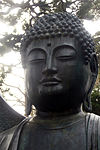Our website is made possible by displaying online advertisements to our visitors.
Please consider supporting us by disabling your ad blocker.
Secular Buddhism
This article needs additional citations for verification. (April 2015) |
| Part of a series on |
| Western Buddhism |
|---|
 |
| Part of a series on |
| Buddhism |
|---|
 |
| Part of a series on |
| Nontheistic religion |
|---|
Secular Buddhism—sometimes also referred to as agnostic Buddhism, Buddhist agnosticism, ignostic Buddhism, atheistic Buddhism, pragmatic Buddhism, Buddhist atheism, or Buddhist secularism—is a broad term for a form of Buddhism based on humanist, skeptical, and agnostic values, valuing pragmatism and (often) naturalism, eschewing beliefs in the supernatural or paranormal. It can be described as the embrace of Buddhist rituals and philosophy for their secular benefits by people who are atheist or agnostic.
Secular Buddhists interpret the teachings of the Buddha and the Buddhist texts in a rationalist and often evidentialist manner, considering the historical and cultural contexts of the times in which the Buddha lived and in which the various sutras and tantras were written.
The secular Buddhist framework strips Buddhist doctrine of various traditional beliefs that could be considered superstitious, or that cannot be tested through empirical research, such as: supernatural beings (such as devas, bodhisattvas, nāgas, pretas, Buddhas, etc.), merit and its transference, rebirth, and karma,[1] Buddhist cosmology (including the existence of pure lands and hells), etc.[2]
Traditional Buddhist ethical views regarding social issues such as abortion and human sexuality may or may not be called into question as well, with some schools, especially Western Buddhist ones, taking alternative stances.
- ^ Vernon, Mark (10 March 2010). "The new Buddhist atheism". The Guardian. Archived from the original on 22 July 2019.
- ^ Fronsdal, Gil (2014). "Natural Buddhism". Insight Journal. Barre Center for Buddhist Studies.
Previous Page Next Page


